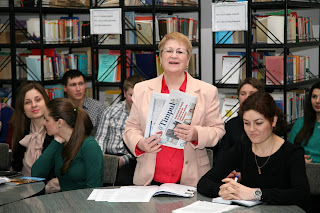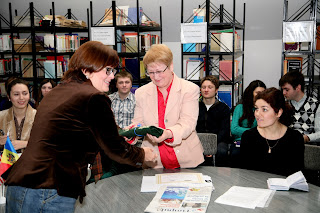Free press in Moldova is a sort of answer to the state-controlled television media, mostly Russian-controlled, and full of propaganda. In Moldova, political parties have a lot of influence over much of the media, and media organizations are fighting to freedom of the press with the help of The International Freedom for Press, an NGO working to achieve this goal. One of the biggest problems is that Moldova experiences a lack of a strong economy, allowing for politicians to manipulate the press and use it to their advantage by influencing and controlling content. There is also an effort to change the mentality of journalists through education and training; the biggest focus is eliminating propaganda and increasing the amount of actual information available to the public. Access to objective information is difficult due to the amount of control that outside influence has over what is actually released.
In a free country, the press is free, and establishing a free press is an important step in improving the condition of Moldovan society. There are a lot of newspapers in Moldova, and the strongest effort is to increase the number of papers printed in Romanian, and getting them in front of Russian speakers to ensure non-bias. The internet has helped in this effort, and provides a higher level of access for those looking for a less propagandized source of news.
Our next speaker was a great Irishman named Ronan Goggin, Communications Officer for EUBAM, the European Union Border Assistance Mission to Moldova and Ukraine. EUBAM was created in 2005 when ten new member states were admitted into the EU all at once, expanding the EU borders. One of the primary objectives of EUBAM is to be a presence in the Transnistrian conflict and to make up for lack of border security there.
EUBAM is headquartered in Odessa, which is the largest port in the Black Sea, where there are a lot of economic and security concerns. Smuggling is a major problem which adversely affects the economies of the countries involved, and the conflict in Transnistria only serves to exacerbate these problems, due to the fact that there is no Moldovan presence there and no international recognition. This leaves much of the objective security responsibility to organizations like EUBAM.
EUBAM also works on an association process between Moldova and the EU on securing Moldova's borders to European Union standards, helping their efforts to obtain Visa liberalization. Open borders with neighboring countries would be a huge step to Moldova's path to EU membership, and they will need to show that their borders are secure and stable in order to achieve this.
The implementation of legislation to fight corruption is also one of EUBAM's primary focuses in the region, and they work with border police and customs departments, sharing intelligence and contacts in order to fight organized crime such as smuggling and human trafficking. There was a recent project which took customs officers from both Chisinau and Tiraspol to the German / Swiss border to observe activities of customs officers on a friendly border. Currently, there is a program in effect which allows Transnistrian companies who register with authorities in Chisinau to trade with Moldova and Ukraine in an effort to alleviate some of the tensions in the region and hopefully work towards an amicable solution to the conflict.
A lack of security on the borders slows down trade and economic progress, exacerbating socioeconomic problems and increasing instability on average citizens.
Before leaving ULIM, we presented the library with a book donation, took a more expanded tour of the University and even got to go up to the roof for a great view of downtown Chisinau. Then, we hopped into a taxi and headed over to our next seminar, held at the American Resource Center, a division of the American Embassy, where we learned about the United States government's presence in Moldova, and the efforts being taken to help them consolidate democracy, develop economic prosperity, and strengthen the rule of law.
USAID, United States Agency for International Development, is an organization working to strengthening the rule of lay and fighting corruption in Moldova. The citizens do not fully trust the judiciary or the police force, which causes a lot of problems in developing a stable civil society. USAID is currently working to install audio video equipment in every courtroom, allowing proceedings to be uploaded and accessible to everyone. This will hold courts accountable and create a transparency that will hopefully instill some trust back into the judiciary. They area also training local police forces in forensics and polygraph testing.
USAID also works towards economic prosperity, helping farmers produce value-added agriculture of exportable produce. $260 million has been provided for developing countries to improve irrigation systems and public infrastructure to allow for more viable crops and more efficient transportation of them.
Strengthening civil society is a large focus of the American Resource Center, and small grants are often provided for work on democracy projects including civic involvement and improving the condition of human rights in Moldova.
We then heard from a panel made up of organizations working to improve civil society in Moldova, including representatives from Lestrada, an organization whose focus is preventing domestic violence, human trafficking, and the sexual exploitation of children, Wave Week Moldova, a leadership and community service camp for teenagers, and the Lions Club in Chisinau, who we have previously worked with at the municipal orphanage.
Once our time at the American Resource Center was wrapped up, we visited Casa Marioarei, a domestic violence shelter in Chisinau. Here, we met Lindsey, a Peace Corps volunteer, who gave us a presentation on the extent of domestic violence in Moldova. Casa Marioarei provides services for the victims of domestic violence and human trafficking, but there is an overwhelming lack of specialization and understanding of the problem of domestic violence in Moldova.
Casa Marioarei was founded in 2000 and opened in 2004. It is not supported by the state, rather, they depend on donations and mostly the services of volunteers. There is room for twenty-five women and children on site, and they also offer day consults in the way of legal advice, psychological, social, and medical services for victims who are not able to stay at the center.
Today was pretty intense - lots of exposure to so many of the problems facing Moldova's civil society and the great need for assistance to strengthen it. Luckily, we got to wrap up the day in Cathedral Park, which is beautiful!
Professor Tatiana Corai
Dr. M presenting Professor Tatiana Corai with her TShirt and Certificate
Ronan Goggin
Ronan Goggin talking about border security
Book Donation
Royale, Sebastian, Patricia, Kendel, me, and Jared at ULIM
Our group on a tour of ULIM
The Dancing Americans of Moldova!
Rooftop view of Chisinau from ULIM
Ceiling at ULIM
On the roof of ULIM
On the roof of ULIM
ULIM tour
ULIM tour
Library at ULIM
Library at ULIM
ULIM tour
ULIM tour
ULIM tour
ULIM tour
ULIM tour
ULIM tour
ULIM Tour
ULIM tour
On the roof at ULIM
Jared's favorite taxi ride! Jared, Kendel, Me, and Dr. M in close quarters!
(And that's all I'll say about this one!!!!!)
Outside the American Resource Center
Me and Royale, being typical Americans
The American Resource Center
Lindsey, of Casa Marioarei
Cathedral Park in Chisinau
Cathedral Park in Chisinau
































No comments:
Post a Comment